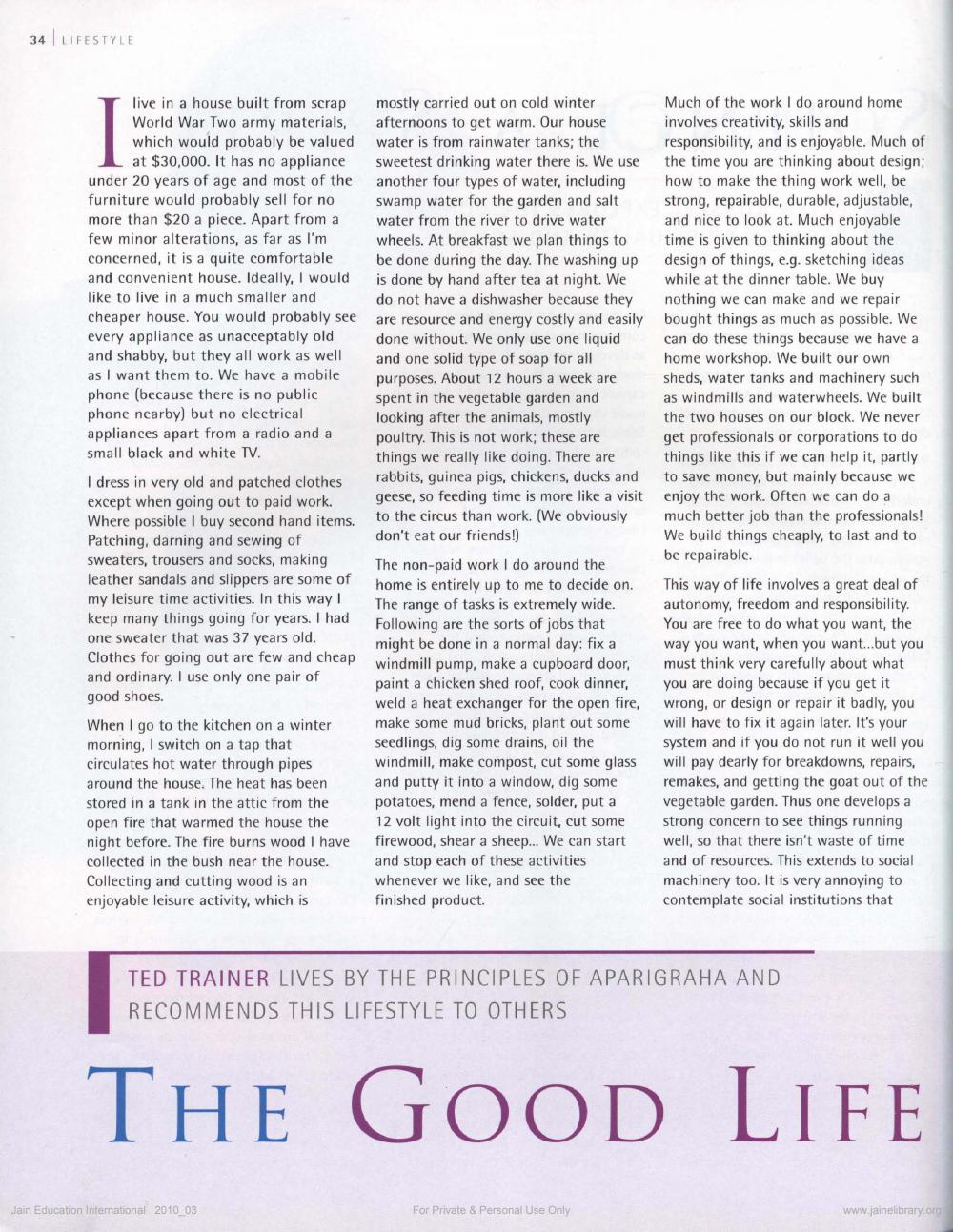________________
34 LIFESTYLE
I
live in a house built from scrap World War Two army materials, which would probably be valued at $30,000. It has no appliance under 20 years of age and most of the furniture would probably sell for no more than $20 a piece. Apart from a few minor alterations, as far as I'm concerned, it is a quite comfortable and convenient house. Ideally, I would like to live in a much smaller and cheaper house. You would probably see every appliance as unacceptably old and shabby, but they all work as well as I want them to. We have a mobile phone (because there is no public phone nearby) but no electrical appliances apart from a radio and a small black and white TV.
I dress in very old and patched clothes except when going out to paid work. Where possible I buy second hand items. Patching, darning and sewing of sweaters, trousers and socks, making leather sandals and slippers are some of my leisure time activities. In this way I keep many things going for years. I had one sweater that was 37 years old. Clothes for going out are few and cheap and ordinary. I use only one pair of good shoes.
When I go to the kitchen on a winter morning, I switch on a tap that circulates hot water through pipes around the house. The heat has been stored in a tank in the attic from the open fire that warmed the house the night before. The fire burns wood I have collected in the bush near the house. Collecting and cutting wood is an enjoyable leisure activity, which is
mostly carried out on cold winter afternoons to get warm. Our house water is from rainwater tanks; the sweetest drinking water there is. We use another four types of water, including swamp water for the garden and salt water from the river to drive water wheels. At breakfast we plan things to be done during the day. The washing up is done by hand after tea at night. We do not have a dishwasher because they are resource and energy costly and easily done without. We only use one liquid and one solid type of soap for all purposes. About 12 hours a week are spent in the vegetable garden and looking after the animals, mostly poultry. This is not work; these are things we really like doing. There are rabbits, guinea pigs, chickens, ducks and geese, so feeding time is more like a visit to the circus than work. (We obviously don't eat our friends!)
Jain Education International 2010_03
The non-paid work I do around the home is entirely up to me to decide on. The range of tasks is extremely wide. Following are the sorts of jobs that might be done in a normal day: fix a windmill pump, make a cupboard door, paint a chicken shed roof, cook dinner, weld a heat exchanger for the open fire, make some mud bricks, plant out some seedlings, dig some drains, oil the windmill, make compost, cut some glass and putty it into a window, dig some potatoes, mend a fence, solder, put a 12 volt light into the circuit, cut some firewood, shear a sheep... We can start and stop each of these activities whenever we like, and see the finished product.
Much of the work I do around home involves creativity, skills and responsibility, and is enjoyable. Much of the time you are thinking about design; how to make the thing work well, be strong, repairable, durable, adjustable, and nice to look at. Much enjoyable time is given to thinking about the design of things, e.g. sketching ideas while at the dinner table. We buy nothing we can make and we repair bought things as much as possible. We can do these things because we have a home workshop. We built our own sheds, water tanks and machinery such as windmills and waterwheels. We built the two houses on our block. We never get professionals or corporations to do things like this if we can help it, partly to save money, but mainly because we enjoy the work. Often we can do a much better job than the professionals! We build things cheaply, to last and to be repairable.
TED TRAINER LIVES BY THE PRINCIPLES OF APARIGRAHA AND RECOMMENDS THIS LIFESTYLE TO OTHERS
THE GOOD LIFE
For Private & Personal Use Only
This way of life involves a great deal of autonomy, freedom and responsibility. You are free to do what you want, the way you want, when you want...but you must think very carefully about what you are doing because if you get it wrong, or design or repair it badly, you will have to fix it again later. It's your system and if you do not run it well you will pay dearly for breakdowns, repairs, remakes, and getting the goat out of the vegetable garden. Thus one develops a strong concern to see things running well, so that there isn't waste of time and of resources. This extends to social machinery too. It is very annoying to contemplate social institutions that
www.jainelibrary.org




